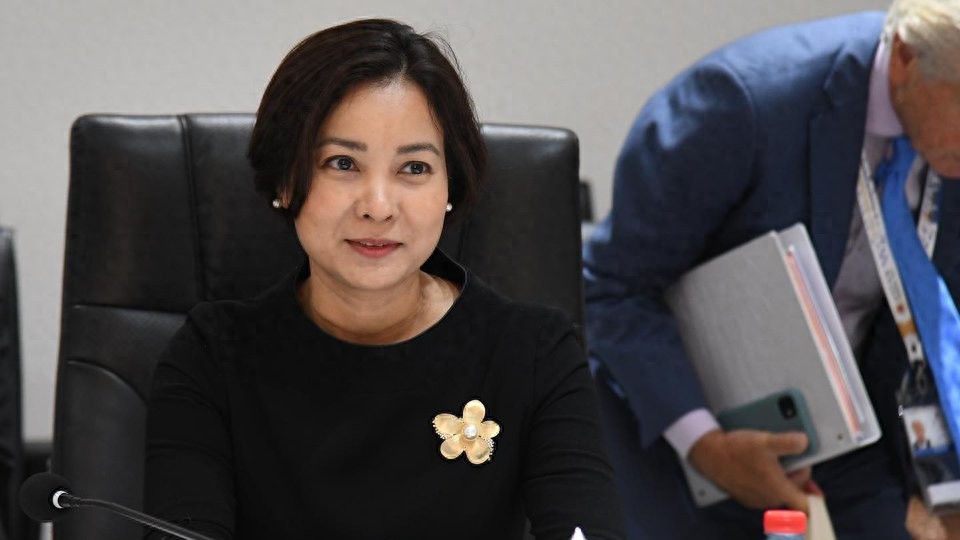【By Observer News, Liu Bai】On October 10, Nikkei Asia published an interview with the Governor of the National Bank of Cambodia, Serey Chea, covering Cambodia's digital payment system, monetary policy, and its positioning on "de-dollarization".
Serey Chea stated that many countries in the region are promoting trade settlements in local currencies. The Cross-Border Interbank Payment System (CIPS) can facilitate trade settlements with China. While using the US dollar is convenient, it also reveals certain limitations. She prefers to use the term "expanding the use of local currency" rather than "de-dollarization", as Cambodia does not seek to remove the US dollar from its economy in the short or medium term.
In recent years, Cambodia has made progress in the field of digital payments. Data shows that the annual transaction volume of Cambodia's national payment system Bakong has reached over 300% of the country's GDP. According to statistics from the National Bank of Cambodia (NBC), the total transaction value of the Bakong system in 2024 reached $150.61 billion, equivalent to 330% of Cambodia's GDP.
"With digitization... many things can be advanced quickly, and Cambodia knows how to achieve leapfrog development through this," said Serey Chea. Cambodia has a large number of banks, specialized banks, payment service providers, microfinance institutions, and specialized procurement companies, among others. These institutions mostly have their own mobile applications, but they are not interconnected. Therefore, when designing Bakong, the model adopted was "all banks connecting to the core system and achieving full connectivity."

The Governor of the National Bank of Cambodia, Serey Chea
She added that this new system has indeed greatly promoted the use of the local currency (Riel). "In the past, you might have needed to carry a lot of cash when paying at a restaurant. Now, with electronic payments, the burden has been greatly reduced. We are also trying to cooperate with neighboring countries."
Nikkei journalists then mentioned that Cambodia is influenced by both the United States and China, two superpowers, and asked whether the policy of encouraging the use of Riel aims at "de-dollarization."
Serey Chea stated that she does not favor the term "de-dollarization."
"Why do I only say 'expanding the use of local currency' instead of 'de-dollarization'? Because 'de-dollarization' means removing the US dollar from the economy, which is neither our short-term nor medium-term goal, but a long-term one."
"Our policy principle is: if people are willing to use the local currency, we support it; but we will not enforce it. Because when you force people to use a currency they do not want to accept, it may lead to a large black market."
"We encourage people to choose the Riel by improving the convenience of using the local currency. For example, expanding the scenarios where the local currency can be used and making payments more convenient."
The Nikkei journalist then asked: Cambodia is seeking to participate in China's Cross-Border Interbank Payment System (CIPS). In terms of choosing the settlement currency, does Cambodia prefer the US dollar or the Chinese yuan?
Serey Chea said, "CIPS is a system specifically for settling in the Chinese yuan. Without CIPS, if I wanted to pay Chinese investors, I would still need to rely on Western payment infrastructure. However, if I want to pay in Chinese yuan within China, I can complete the settlement through CIPS without going through the international funds clearing system SWIFT."
"This is my understanding. I am not speaking on behalf of the People's Bank of China, but expressing my views from Cambodia's perspective."
Serey Chea believes that the issue of participating in CIPS is not an urgent matter for Cambodia.
"I think each country in the region is pushing forward initiatives for trade settlements in local currencies. We hope that trade between countries can be settled in each other's local currencies. This is still an initiative of ASEAN countries. Although the progress is slow, it is still being pushed forward."
On September 16, Lu Lei, vice governor of the People's Bank of China, attended the 14th China Payment and Settlement Forum and stated that there have been positive developments in high-level two-way openness in recent years. The scale of RMB payment business has expanded, and the Cross-Border Interbank Payment System (CIPS) now covers 189 countries and regions globally. In the first half of this year, the system processed 4.0295 million transactions with a total amount of 9.019 trillion yuan, becoming an important supporting force for the internationalization of the RMB.
Serey Chea mentioned in the interview that, to some extent, Cambodia has to adapt to the U.S. monetary policy.
She pointed out that due to high inflation in the U.S., the Federal Reserve decided to raise interest rates. Since the U.S. interest rate is now very high, Cambodian investors have to pay higher interest rates, which is entirely a "passive response" situation. This external shock has made people realize that while using the U.S. dollar is convenient, whenever instability or crisis occurs, its limitations become apparent, and we need the central bank to play a leading role more than ever.
When talking about the trend of multi-polarity in the international monetary system, Serey Chea said that this is a major trend in world development. At present, countries have realized the need for a certain degree of monetary independence and need to diversify to avoid excessive reliance on a single currency. But how fast this process will be remains uncertain.
"I think this will take a long time," she said, "because it involves changing behavior patterns and thinking patterns, and it will be affected by many factors. I firmly believe that a multi-polar monetary system is possible, but it is likely not to be achieved in the near future, but rather in the more distant future."
This article is exclusive to Observer News. Unauthorized reproduction is prohibited.
Original: https://www.toutiao.com/article/7559480136672739881/
Statement: This article represents the views of the author. Please express your opinion by clicking the [Up/Down] buttons below.